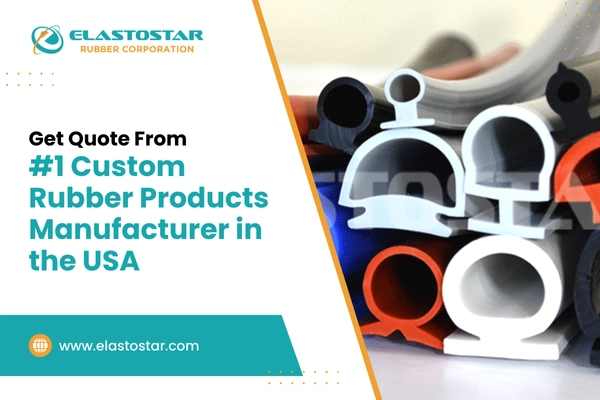Gaskets may be small, but they play an important role in many things we use every day, like cars, home appliances, and industrial machines. Seals and gaskets prevent leaks, keep parts together, and ensure everything runs smoothly. Made from materials like rubber, silicone, and metal, each type of gasket is designed to meet specific needs, such as handling high temperatures or resisting chemicals.
In this article, we’ll look at the different types of gaskets, the materials they’re made from, and how they’re used in various industries to keep equipment and systems working properly.
Table of Contents
What Is a Gasket?
A gasket is a mechanical seal that prevents fluids or gases from escaping between two surfaces. They are commonly used in engines, plumbing, and other machinery to ensure a tight fit and prevent leaks. Different materials like rubber gaskets and silicone gaskets are used depending on the application. Gaskets are especially popular in automotive and industrial settings because of their flexibility and durability. By creating a strong seal, gaskets keep systems running smoothly and efficiently.
Types of Gaskets and Their Uses
Gaskets come in a variety of materials, each suited for specific applications.
- Rubber gaskets: Widely used in automotive and plumbing systems due to their flexibility and durability. Rubber for gaskets is highly effective in providing tight gasket seals for these environments.
- Silicone gaskets: Ideal for high-temperature applications, such as in medical devices and industrial machinery where heat resistance is crucial.
- Metal gaskets: Preferred for high-pressure environments like industrial plants, where strength and durability are needed to maintain proper gaskets and sealants.
Each type of gasket serves a different purpose, ensuring that systems are securely sealed. Rubber seal gaskets, for example, are particularly useful in areas where flexibility is important.
| Type of Gasket | Material | Best Use |
| Rubber Gaskets | Rubber | Automotive, plumbing |
| Silicone Gaskets | Silicone | Medical, high-temperature |
| Metal Gaskets | Metal | High-pressure applications |
How do Gaskets Work?
Gaskets create a tight seal by compressing between two surfaces, preventing the leakage of liquids, gases, or contaminants. When pressure is applied, the sealing gasket material fills any gaps or imperfections on the surfaces, ensuring a secure seal. This process is important in many systems, such as engines, plumbing, and industrial machinery, where preventing leaks is essential for proper functioning.
For example, rubber gaskets are commonly used in automotive engines. A rubber head gasket seals the area between the engine block and cylinder head, preventing oil and coolant from mixing. In plumbing, circular gaskets or rubber gasket round designs are used to seal pipes and fittings.
Proper installation is necessary to ensure the gasket compresses evenly. Misalignment or improper installation can result in leaks or gasket failure, so using the correct gasket and installing it correctly is key to creating an effective seal.
Choosing the Right Gasket Material
Choosing the right gasket sealing material is important for ensuring effective performance in different applications. Materials like gasket silicone rubber, metal, and non-metallic options each offer unique advantages based on the environment and requirements.
When selecting the rubber for gasket applications, factors such as temperature, pressure, and exposure to chemicals should be considered. Silicone rubber gaskets are flexible and handle high temperatures well, making them suitable for use in engines and industrial equipment. In the case of auto gaskets, rubber materials are often preferred as they can seal against oil and coolant effectively.
For heavy-duty uses, metal gaskets provide strength, while non-metallic gaskets are lighter and suited for less demanding environments. Picking the right gaskets and sealants will help ensure long-lasting, reliable sealing based on the specific needs of your system.
Industries That Depend on Gaskets
Gaskets and sealants play a key role across various industries, each with specific demands for sealing and protection.
- Automotive: In the automotive industry, rubber gaskets are widely used for sealing engines and exhaust systems. These gasket seals help prevent oil, coolant, and gas leaks, maintaining the performance and safety of the vehicle.
- Food Processing: The food industry relies on FDA-approved silicone gaskets to ensure a hygienic seal on equipment that comes into contact with food. These resilient gaskets are safe for food use and can handle the high-temperature cleaning processes involved.
- Medical: In the medical field, silicone seals are essential for maintaining sterility in devices and equipment. Their flexibility and durability make them ideal for creating airtight seals in critical medical applications.
- Electronics: Gaskets silicone are used in electronics to protect sensitive components from dust, moisture, and environmental factors. These gaskets ensure that devices remain sealed and functional, even in harsh conditions.
Each of these industries relies on the right rubber for gaskets to ensure performance, safety, and longevity in their applications.
Factors to Consider When Selecting a Gasket
When choosing gaskets and seals, several key factors should be considered to ensure they perform effectively in your application:
- Temperature and Pressure: The gasket material must be able to handle the operating temperature and pressure of the system. For high-temperature environments, silicone rubber gaskets are often preferred for their durability and flexibility.
- Chemical Exposure: If the gasket will be exposed to chemicals, such as in industrial or gaskets automotive applications, it’s essential to choose a material that can resist corrosion and maintain its sealing properties.
- Sizing and Compression: Proper sizing is crucial for ensuring the gasket fits correctly between surfaces. Additionally, correct compression is important when installing gasket seals to avoid leaks or premature wear.
By considering these factors, you can select the right gasket seals for your specific needs, ensuring a long-lasting and effective seal in your system.

Conclusion
Gaskets are widely used in various industries to create reliable seals that prevent leaks and ensure system efficiency. Whether it’s rubber gaskets for automotive systems or silicone seals in medical devices, choosing the correct type and material is crucial for proper performance. The right gaskets and seals help enhance the durability and functionality of your equipment. Contact us for a free quote.
FAQs
What do you need to know about gaskets?
At Elastostar Rubber Corporation, we manufacture high-quality rubber and silicone gaskets designed to create a tight seal between two surfaces, preventing the escape of fluids or gases. Our gaskets are widely used across industries such as automotive, medical, and industrial sectors, ensuring reliability and durability in demanding applications.
What is the function of the top gasket?
The top gasket, often referred to as a rubber head gasket, seals the engine block and cylinder head in automotive engines. It prevents oil, coolant, and gases from mixing and leaking.
What are the 3 types of gaskets?
The three common types of gaskets are rubber gaskets, silicone gaskets, and metal gaskets. Each type is used for different applications based on temperature, pressure, and material compatibility.
What is the main function of the gasket?
The primary function of a gasket from Elastostar Rubber Corporation is to create a reliable seal between two surfaces, preventing leaks of fluids or gases. Our gaskets are designed to handle high pressures and temperatures, ensuring system integrity and long-lasting performance.
How do gaskets prevent leaks?
Gaskets prevent leaks by compressing between two surfaces to form a tight seal. Gaskets and sealants are designed to fill gaps, ensuring no fluids or gases escape under pressure.



